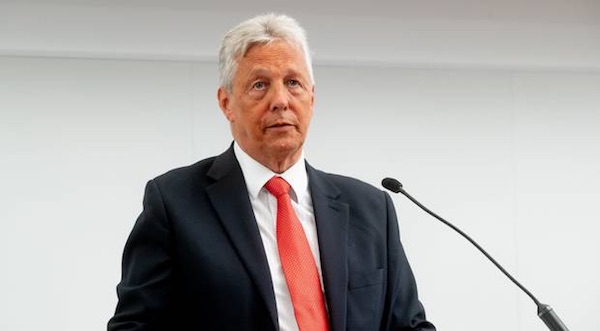
Peter Robinson, the former leader of the hardline unionist DUP, has suggested agreement on a strategy for phased reunification could allow him to support a Six County referendum on unity.
In unusual comments, he said there was a need for processes and timescales on Irish unity to be agreed in advance to avoid disruption if unification was ever backed, rather than having to “tackle the issue on the fly”.
The 1998 Good Friday Agreement allows for a Six County simple-majority poll on reunification to take place every seven years, but subject to the approval of the British government.
Calls by Sinn Fein and others for a border poll have increased since the Brexit referendum. Evidence of shifting demographics in the Six Counties, and preparations for a second referendum on independence in Scotland, have added pressure for a poll to take place.
Traditional republicans reject the concept of a border poll as upholding the partition of Ireland and seek a single, national act of self-determination.
Robinson said he could not accept a simple majority vote on unity, which he said would bring “chaos”. He said that any border polls should be “fixed” in time and “generational” -- once in a generation, rather than the seven-year gap set out in the Good Friday Agreement.
The 69-year-old retired politician made the comments during a lecture at Queen’s University in Belfast, and stressed he remained “very confident” that voters within the Six Counties would opt to remain in a United Kingdom with Britain.
The former DUP leader suggested he had “pulled the pin out of the grenade” with his remarks, which received a mixed reaction. Unionist commentator Newton Emerson described them as “absolutely jaw-dropping”.
“I have never heard a unionist leader speak so frankly and calmly about the transition to a united Ireland,” he said. “This was essentially Robinson saying ‘yes the vote for a united Ireland is almost demographically inevitable and unionists should approach that and plan for that on a generation by generation basis.”
But Sinn Fein’s Declan Kearney wrote that “at its core, the Peter Robinson speech is proxy for an unchanged DUP agenda of dismantling the Good Friday Agreement and redefining democracy”.
Two former colleagues of Mr Robinson distanced themselves from the proposal. DUP MP Jeffrey Donaldson said a border poll would be “divisive and unsettling” at a time when trust and reconciliation needed to be built upon.
Fellow DUP MP Sammy Wilson disagreed with the idea of staging of a referendum every generation. “The best way of taking the border out of politics is not to have it there as an issue,” he said, without irony. “That makes the day to day running of the country workable and attractive to people.”
But Robinson said there was a need for processes and timescales to be agreed in advance, rather than having to “tackle the issue on the fly” if unification was ever backed.
“I am alluding to the need to agree a process for negotiations, timescales and not only the means of reaching agreement on all the particulars but also who would be involved in negotiating such an agreement.
“With those details settled, my own view, for what it’s worth, is that fixed generational border polls would be less divisive and disruptive of our local political process.”
Any border poll would be divisive and “a bad idea”, according to the 26 County Taoiseach Leo Varadkar, who was visiting Belfast this week. He said “a simple majority is enough”, but questioned whether it would be a “good thing”.
“I think a border poll would be defeated and very divisive. We should be respecting the primacy of the Good Friday Agreement,” he said.
Opinion polls on reunification continue to produce vastly different results. The latest survey this week by the local LucidTalk firm, which operates online and by telephone, suggests that 42% of the voting public supports Irish unity. That is double the 21% number indicated in a survey conducted in person and published last month by Ipsos, a global market research company.
Nevertheless, Matt Carthy, who is chair of Sinn Fein’s ‘United Ireland’ campaign, said the latest poll confirmed a significant trend in rising support for Irish unity among citizens in the North.
“The results reflect three important trends. First, there has been a consistent rise in the proportion of people who say they would vote for a united Ireland. The gap is narrowing with support for unity just 3% behind support for the constitutional status quo.
“Second, this trend is most pronounced among young people under 45, where almost half want unity while 38% favour the North being under British jurisdiction.
“And thirdly, this poll reflects the continuing major influence of the Brexit debacle on shaping attitudes on this issue in the North, with 28% saying they are more likely to support Irish unity as a result.
“While I always take opinion polls with a grain of salt, the trend is clear. Such a significant change in attitudes represents a historic opportunity for all those of who support a united Ireland to act together to win a referendum on Irish unity in the near future, a right provided for under the terms of the Good Friday Agreement.”
![[Irish Republican News]](https://republican-news.org/graphics/title_gifs/rn.gif)
![[Irish Republican News]](https://republican-news.org/graphics/title_gifs/harp.gif)

